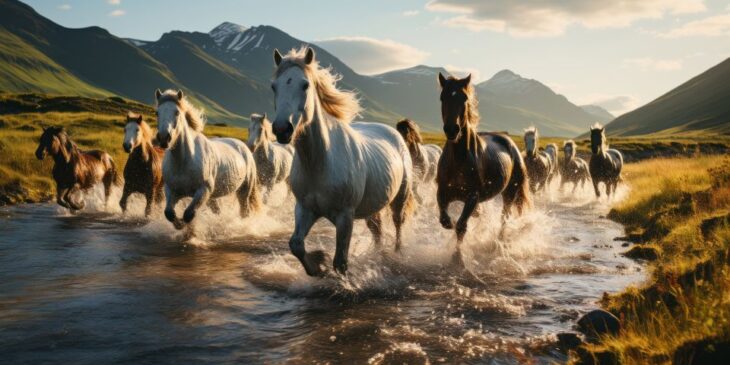Wild Horses
These wild grazers in the North,
Roam freely with the wind passing up and forth,
They march towards, through our eyes we cannot see,
Lowered steppes and flowering grasslands they’re free,
Their manes breeze in the gust,
Hopeless tears sunken in the dirt,
Petals fall covering our eyes,
The beauty that we can no longer see,
Fear and redemption cry out our name,
The fault we made, the guilt we face,
The trembling ground shakes,
Hordes of them were here, footprints preserved,
They were free, dust blasting from their hooves,
Miles, they run, as natural giles,
Towards the sunset, they drove,
Completing the scenery with its final blow.
By Sarah Shahzad, August 2023
About the Poem “Wild Horses”
(AI prospective – https://chat.openai.com/)
“Wild Horses” is a poignant poem that captures the essence of these untamed creatures and reflects on the impact of human actions on their freedom and existence. The poem evokes a sense of both awe and regret, as it describes the lives of wild horses in their natural habitat.
The poem begins by describing the wild horses as “wild grazers in the North,” emphasizing their untamed nature and their habitat. The phrase “Roam freely with the wind passing up and forth” paints a vivid image of the horses moving with the wind, emphasizing their freedom and connection to nature. However, there is a contrast between their freedom and the limitation imposed by human perception: “They march towards, through our eyes we cannot see.” This suggests that their true essence and significance might be overlooked by human observers.
The next lines, “Lowered steppes and flowering grasslands they’re free,” highlight their environment and their ability to roam freely within it. The mention of “manes breeze in the gust” and “Hopeless tears sunken in the dirt” portrays a sense of beauty mixed with tragedy, suggesting the contrast between the elegance of the horses and the sorrow of their situation.
The poem takes a reflective turn, depicting the idea that humans have lost sight of the beauty and freedom of these creatures. “Petals fall covering our eyes” suggests that we are blinded by our own concerns and distractions, unable to see the true beauty of the world around us, including the freedom of the wild horses.
“Fear and redemption cry out our name” alludes to the realization of the consequences of human actions, the mistakes made, and the desire for redemption. The phrase “Hordes of them were here, footprints preserved” conveys the impact these horses once had on the land, leaving their mark as a reminder of their presence.
The poem nostalgically recalls the past when the horses were truly free, galloping with energy and natural grace. The lines “They were free, dust blasting from their hooves, / Miles, they run, as natural giles, / Towards the sunset, they drove” paint a vivid picture of their unrestrained movement and connection to the landscape.
The poem concludes with the phrase “Completing the scenery with its final blow,” suggesting that the horses added a final touch of beauty and vitality to the natural landscape. This may also imply that their absence has left the scenery incomplete, hinting at the impact of human interference on the ecosystem.
In summary, “Wild Horses” is a reflective poem that portrays the majesty, freedom, and eventual loss of these untamed creatures. It encourages readers to appreciate the beauty of nature and consider the consequences of human actions on the environment and its inhabitants.


Beautiful poem with explanation good job sarah keep it up post at least once in a week
[…] These postcards could be sold as souvenirs for tourists or as collectibles for those interested in wildlife or nature […]